Mobile Technology and Commerce in IT Infrastructure Management
VerifiedAdded on 2023/03/23
|6
|1510
|98
Report
AI Summary
This report examines the role of mobile technology and commerce within IT infrastructure management, focusing on their application in business analysis. It highlights the increasing reliance on mobile technologies for data transfer, communication, and service delivery in various business sectors. The report discusses mobile commerce applications such as mobile banking, ticketing, and marketing, while also addressing the advantages, such as improved customer experience and productivity, and disadvantages, like security concerns and network reliability. It emphasizes the importance of secure networks and authentic applications to mitigate data breaches and ensure the effective use of mobile technologies in business.
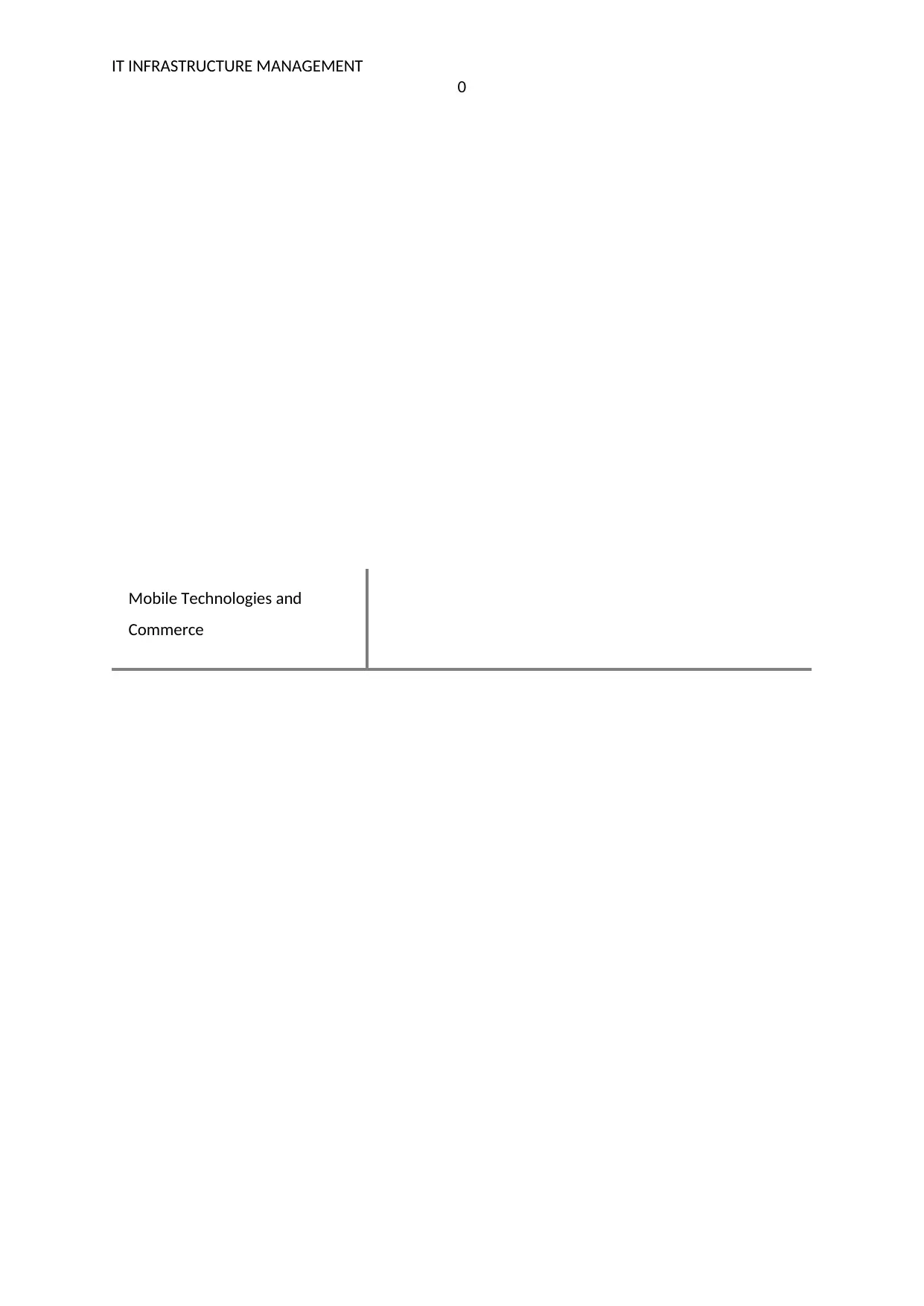
IT INFRASTRUCTURE MANAGEMENT
0
Mobile Technologies and
Commerce
0
Mobile Technologies and
Commerce
Paraphrase This Document
Need a fresh take? Get an instant paraphrase of this document with our AI Paraphraser
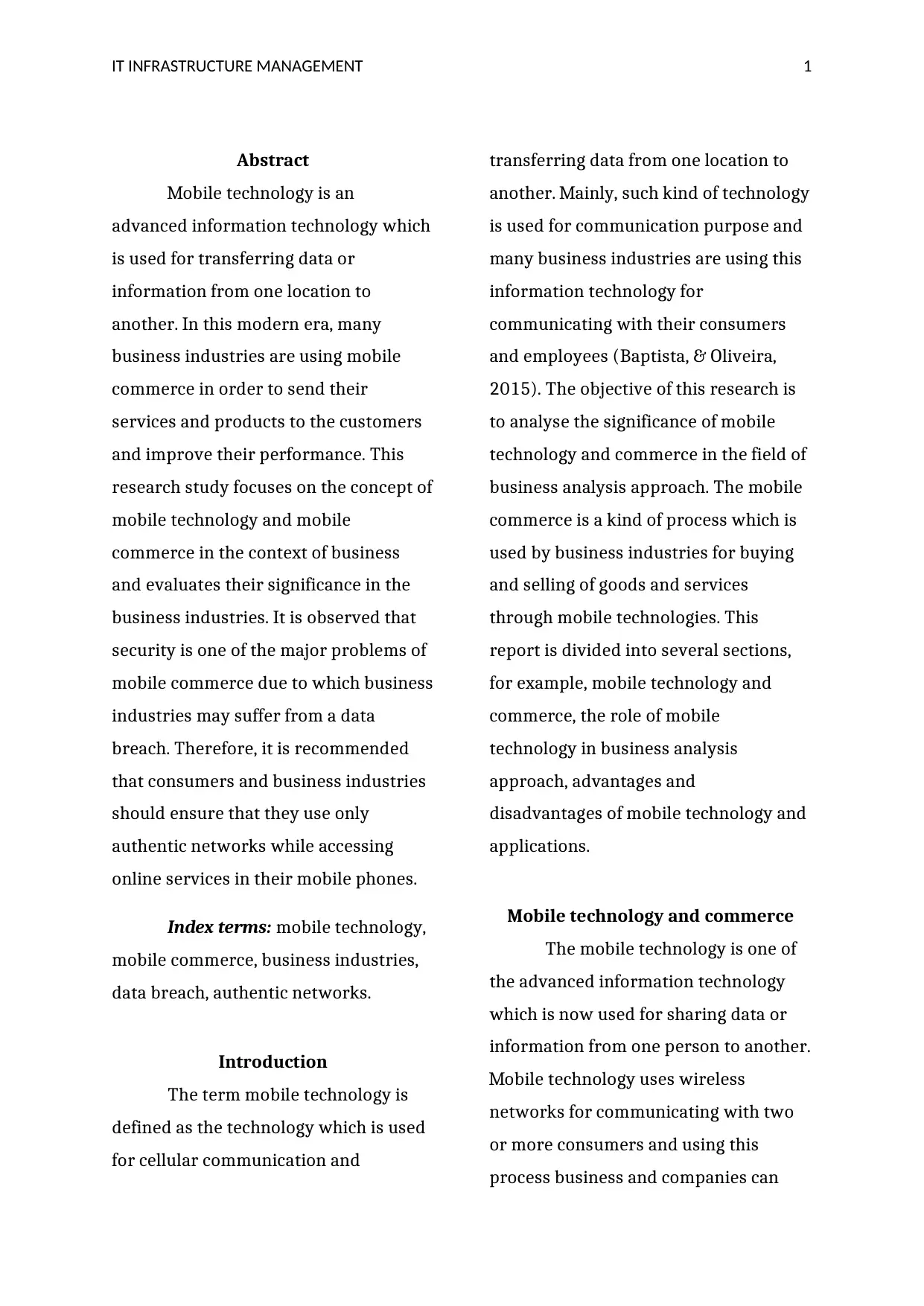
IT INFRASTRUCTURE MANAGEMENT 1
Abstract
Mobile technology is an
advanced information technology which
is used for transferring data or
information from one location to
another. In this modern era, many
business industries are using mobile
commerce in order to send their
services and products to the customers
and improve their performance. This
research study focuses on the concept of
mobile technology and mobile
commerce in the context of business
and evaluates their significance in the
business industries. It is observed that
security is one of the major problems of
mobile commerce due to which business
industries may suffer from a data
breach. Therefore, it is recommended
that consumers and business industries
should ensure that they use only
authentic networks while accessing
online services in their mobile phones.
Index terms: mobile technology,
mobile commerce, business industries,
data breach, authentic networks.
Introduction
The term mobile technology is
defined as the technology which is used
for cellular communication and
transferring data from one location to
another. Mainly, such kind of technology
is used for communication purpose and
many business industries are using this
information technology for
communicating with their consumers
and employees (Baptista, & Oliveira,
2015). The objective of this research is
to analyse the significance of mobile
technology and commerce in the field of
business analysis approach. The mobile
commerce is a kind of process which is
used by business industries for buying
and selling of goods and services
through mobile technologies. This
report is divided into several sections,
for example, mobile technology and
commerce, the role of mobile
technology in business analysis
approach, advantages and
disadvantages of mobile technology and
applications.
Mobile technology and commerce
The mobile technology is one of
the advanced information technology
which is now used for sharing data or
information from one person to another.
Mobile technology uses wireless
networks for communicating with two
or more consumers and using this
process business and companies can
Abstract
Mobile technology is an
advanced information technology which
is used for transferring data or
information from one location to
another. In this modern era, many
business industries are using mobile
commerce in order to send their
services and products to the customers
and improve their performance. This
research study focuses on the concept of
mobile technology and mobile
commerce in the context of business
and evaluates their significance in the
business industries. It is observed that
security is one of the major problems of
mobile commerce due to which business
industries may suffer from a data
breach. Therefore, it is recommended
that consumers and business industries
should ensure that they use only
authentic networks while accessing
online services in their mobile phones.
Index terms: mobile technology,
mobile commerce, business industries,
data breach, authentic networks.
Introduction
The term mobile technology is
defined as the technology which is used
for cellular communication and
transferring data from one location to
another. Mainly, such kind of technology
is used for communication purpose and
many business industries are using this
information technology for
communicating with their consumers
and employees (Baptista, & Oliveira,
2015). The objective of this research is
to analyse the significance of mobile
technology and commerce in the field of
business analysis approach. The mobile
commerce is a kind of process which is
used by business industries for buying
and selling of goods and services
through mobile technologies. This
report is divided into several sections,
for example, mobile technology and
commerce, the role of mobile
technology in business analysis
approach, advantages and
disadvantages of mobile technology and
applications.
Mobile technology and commerce
The mobile technology is one of
the advanced information technology
which is now used for sharing data or
information from one person to another.
Mobile technology uses wireless
networks for communicating with two
or more consumers and using this
process business and companies can
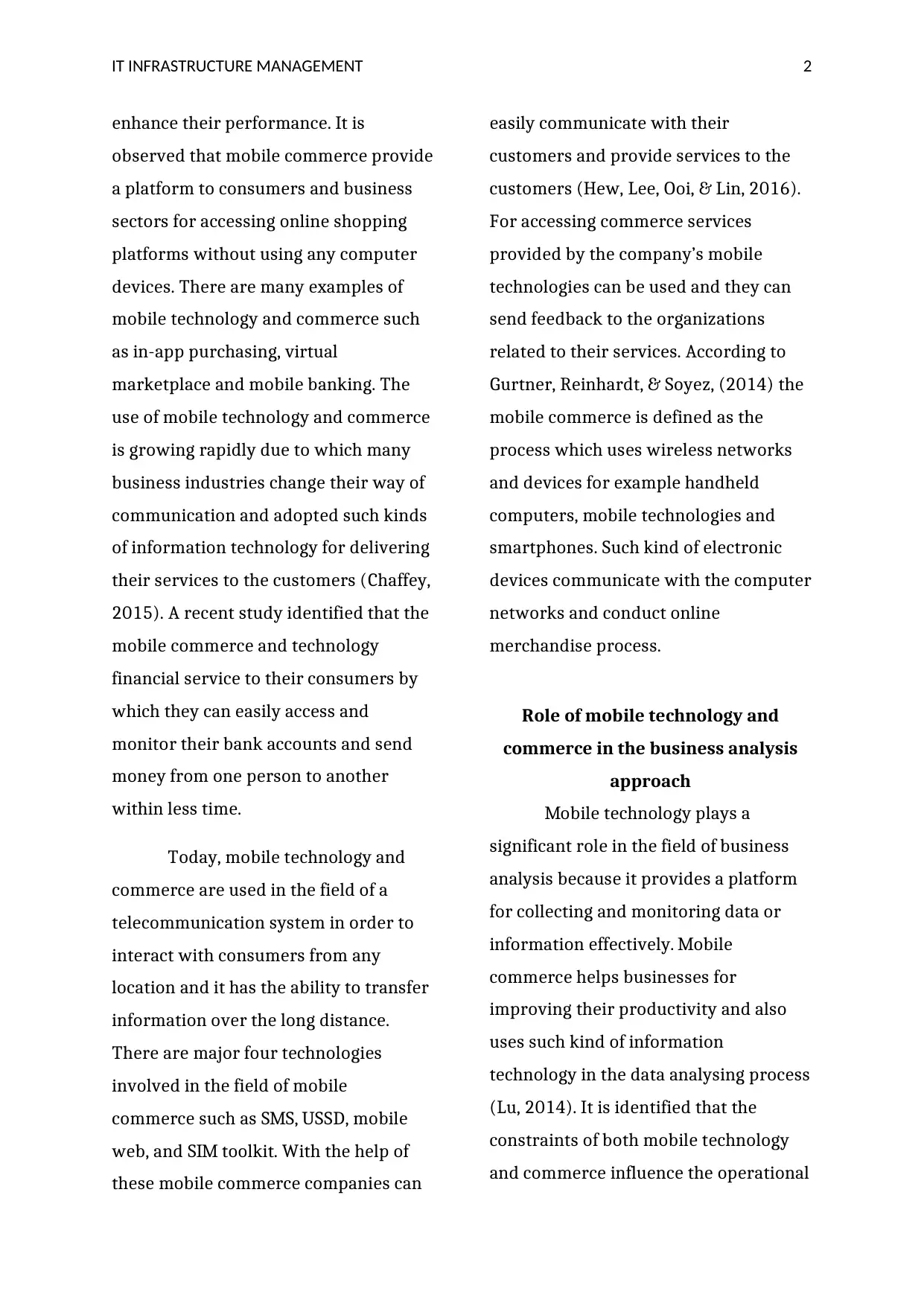
IT INFRASTRUCTURE MANAGEMENT 2
enhance their performance. It is
observed that mobile commerce provide
a platform to consumers and business
sectors for accessing online shopping
platforms without using any computer
devices. There are many examples of
mobile technology and commerce such
as in-app purchasing, virtual
marketplace and mobile banking. The
use of mobile technology and commerce
is growing rapidly due to which many
business industries change their way of
communication and adopted such kinds
of information technology for delivering
their services to the customers (Chaffey,
2015). A recent study identified that the
mobile commerce and technology
financial service to their consumers by
which they can easily access and
monitor their bank accounts and send
money from one person to another
within less time.
Today, mobile technology and
commerce are used in the field of a
telecommunication system in order to
interact with consumers from any
location and it has the ability to transfer
information over the long distance.
There are major four technologies
involved in the field of mobile
commerce such as SMS, USSD, mobile
web, and SIM toolkit. With the help of
these mobile commerce companies can
easily communicate with their
customers and provide services to the
customers (Hew, Lee, Ooi, & Lin, 2016).
For accessing commerce services
provided by the company’s mobile
technologies can be used and they can
send feedback to the organizations
related to their services. According to
Gurtner, Reinhardt, & Soyez, (2014) the
mobile commerce is defined as the
process which uses wireless networks
and devices for example handheld
computers, mobile technologies and
smartphones. Such kind of electronic
devices communicate with the computer
networks and conduct online
merchandise process.
Role of mobile technology and
commerce in the business analysis
approach
Mobile technology plays a
significant role in the field of business
analysis because it provides a platform
for collecting and monitoring data or
information effectively. Mobile
commerce helps businesses for
improving their productivity and also
uses such kind of information
technology in the data analysing process
(Lu, 2014). It is identified that the
constraints of both mobile technology
and commerce influence the operational
enhance their performance. It is
observed that mobile commerce provide
a platform to consumers and business
sectors for accessing online shopping
platforms without using any computer
devices. There are many examples of
mobile technology and commerce such
as in-app purchasing, virtual
marketplace and mobile banking. The
use of mobile technology and commerce
is growing rapidly due to which many
business industries change their way of
communication and adopted such kinds
of information technology for delivering
their services to the customers (Chaffey,
2015). A recent study identified that the
mobile commerce and technology
financial service to their consumers by
which they can easily access and
monitor their bank accounts and send
money from one person to another
within less time.
Today, mobile technology and
commerce are used in the field of a
telecommunication system in order to
interact with consumers from any
location and it has the ability to transfer
information over the long distance.
There are major four technologies
involved in the field of mobile
commerce such as SMS, USSD, mobile
web, and SIM toolkit. With the help of
these mobile commerce companies can
easily communicate with their
customers and provide services to the
customers (Hew, Lee, Ooi, & Lin, 2016).
For accessing commerce services
provided by the company’s mobile
technologies can be used and they can
send feedback to the organizations
related to their services. According to
Gurtner, Reinhardt, & Soyez, (2014) the
mobile commerce is defined as the
process which uses wireless networks
and devices for example handheld
computers, mobile technologies and
smartphones. Such kind of electronic
devices communicate with the computer
networks and conduct online
merchandise process.
Role of mobile technology and
commerce in the business analysis
approach
Mobile technology plays a
significant role in the field of business
analysis because it provides a platform
for collecting and monitoring data or
information effectively. Mobile
commerce helps businesses for
improving their productivity and also
uses such kind of information
technology in the data analysing process
(Lu, 2014). It is identified that the
constraints of both mobile technology
and commerce influence the operational
⊘ This is a preview!⊘
Do you want full access?
Subscribe today to unlock all pages.

Trusted by 1+ million students worldwide
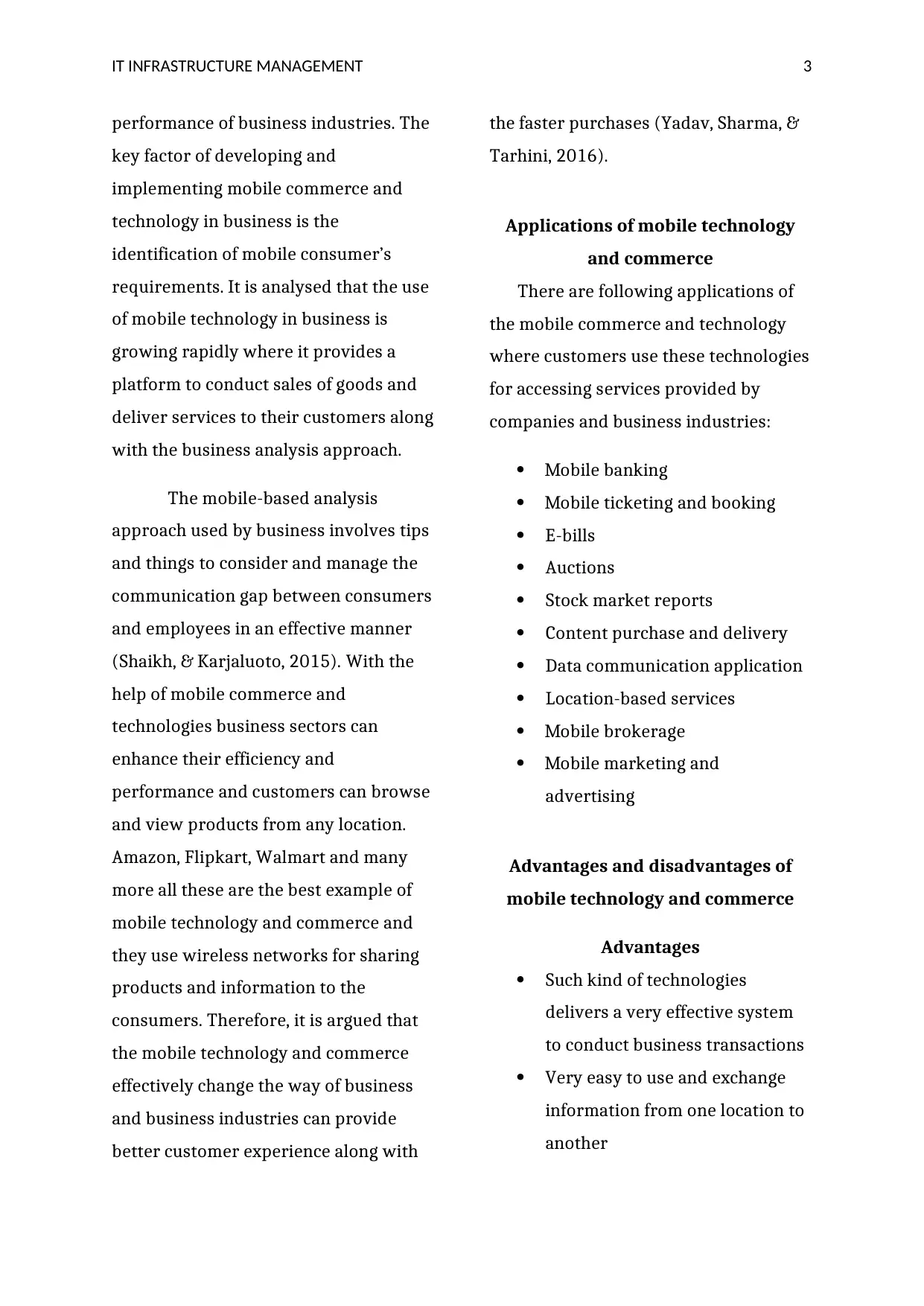
IT INFRASTRUCTURE MANAGEMENT 3
performance of business industries. The
key factor of developing and
implementing mobile commerce and
technology in business is the
identification of mobile consumer’s
requirements. It is analysed that the use
of mobile technology in business is
growing rapidly where it provides a
platform to conduct sales of goods and
deliver services to their customers along
with the business analysis approach.
The mobile-based analysis
approach used by business involves tips
and things to consider and manage the
communication gap between consumers
and employees in an effective manner
(Shaikh, & Karjaluoto, 2015). With the
help of mobile commerce and
technologies business sectors can
enhance their efficiency and
performance and customers can browse
and view products from any location.
Amazon, Flipkart, Walmart and many
more all these are the best example of
mobile technology and commerce and
they use wireless networks for sharing
products and information to the
consumers. Therefore, it is argued that
the mobile technology and commerce
effectively change the way of business
and business industries can provide
better customer experience along with
the faster purchases (Yadav, Sharma, &
Tarhini, 2016).
Applications of mobile technology
and commerce
There are following applications of
the mobile commerce and technology
where customers use these technologies
for accessing services provided by
companies and business industries:
Mobile banking
Mobile ticketing and booking
E-bills
Auctions
Stock market reports
Content purchase and delivery
Data communication application
Location-based services
Mobile brokerage
Mobile marketing and
advertising
Advantages and disadvantages of
mobile technology and commerce
Advantages
Such kind of technologies
delivers a very effective system
to conduct business transactions
Very easy to use and exchange
information from one location to
another
performance of business industries. The
key factor of developing and
implementing mobile commerce and
technology in business is the
identification of mobile consumer’s
requirements. It is analysed that the use
of mobile technology in business is
growing rapidly where it provides a
platform to conduct sales of goods and
deliver services to their customers along
with the business analysis approach.
The mobile-based analysis
approach used by business involves tips
and things to consider and manage the
communication gap between consumers
and employees in an effective manner
(Shaikh, & Karjaluoto, 2015). With the
help of mobile commerce and
technologies business sectors can
enhance their efficiency and
performance and customers can browse
and view products from any location.
Amazon, Flipkart, Walmart and many
more all these are the best example of
mobile technology and commerce and
they use wireless networks for sharing
products and information to the
consumers. Therefore, it is argued that
the mobile technology and commerce
effectively change the way of business
and business industries can provide
better customer experience along with
the faster purchases (Yadav, Sharma, &
Tarhini, 2016).
Applications of mobile technology
and commerce
There are following applications of
the mobile commerce and technology
where customers use these technologies
for accessing services provided by
companies and business industries:
Mobile banking
Mobile ticketing and booking
E-bills
Auctions
Stock market reports
Content purchase and delivery
Data communication application
Location-based services
Mobile brokerage
Mobile marketing and
advertising
Advantages and disadvantages of
mobile technology and commerce
Advantages
Such kind of technologies
delivers a very effective system
to conduct business transactions
Very easy to use and exchange
information from one location to
another
Paraphrase This Document
Need a fresh take? Get an instant paraphrase of this document with our AI Paraphraser
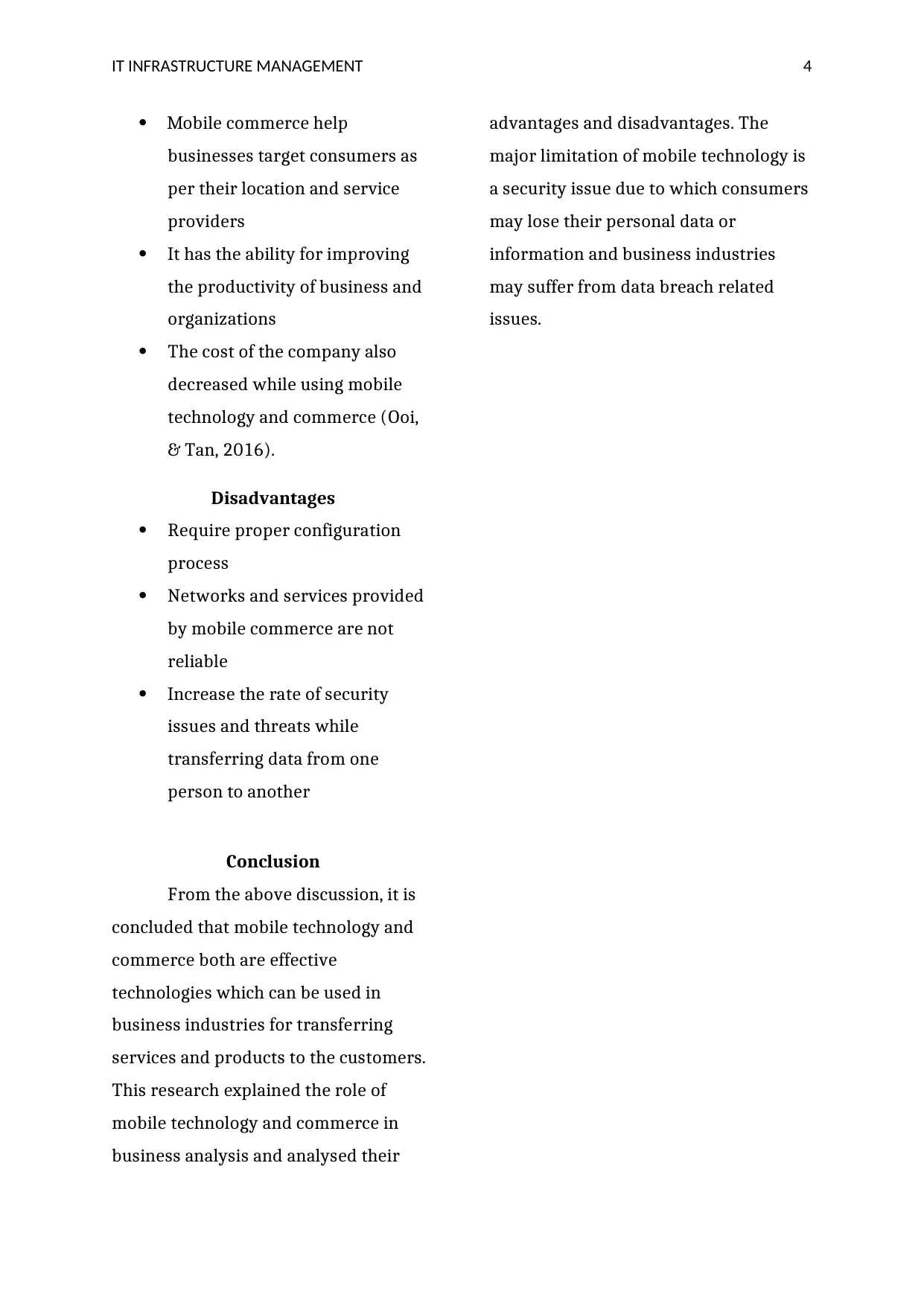
IT INFRASTRUCTURE MANAGEMENT 4
Mobile commerce help
businesses target consumers as
per their location and service
providers
It has the ability for improving
the productivity of business and
organizations
The cost of the company also
decreased while using mobile
technology and commerce (Ooi,
& Tan, 2016).
Disadvantages
Require proper configuration
process
Networks and services provided
by mobile commerce are not
reliable
Increase the rate of security
issues and threats while
transferring data from one
person to another
Conclusion
From the above discussion, it is
concluded that mobile technology and
commerce both are effective
technologies which can be used in
business industries for transferring
services and products to the customers.
This research explained the role of
mobile technology and commerce in
business analysis and analysed their
advantages and disadvantages. The
major limitation of mobile technology is
a security issue due to which consumers
may lose their personal data or
information and business industries
may suffer from data breach related
issues.
Mobile commerce help
businesses target consumers as
per their location and service
providers
It has the ability for improving
the productivity of business and
organizations
The cost of the company also
decreased while using mobile
technology and commerce (Ooi,
& Tan, 2016).
Disadvantages
Require proper configuration
process
Networks and services provided
by mobile commerce are not
reliable
Increase the rate of security
issues and threats while
transferring data from one
person to another
Conclusion
From the above discussion, it is
concluded that mobile technology and
commerce both are effective
technologies which can be used in
business industries for transferring
services and products to the customers.
This research explained the role of
mobile technology and commerce in
business analysis and analysed their
advantages and disadvantages. The
major limitation of mobile technology is
a security issue due to which consumers
may lose their personal data or
information and business industries
may suffer from data breach related
issues.
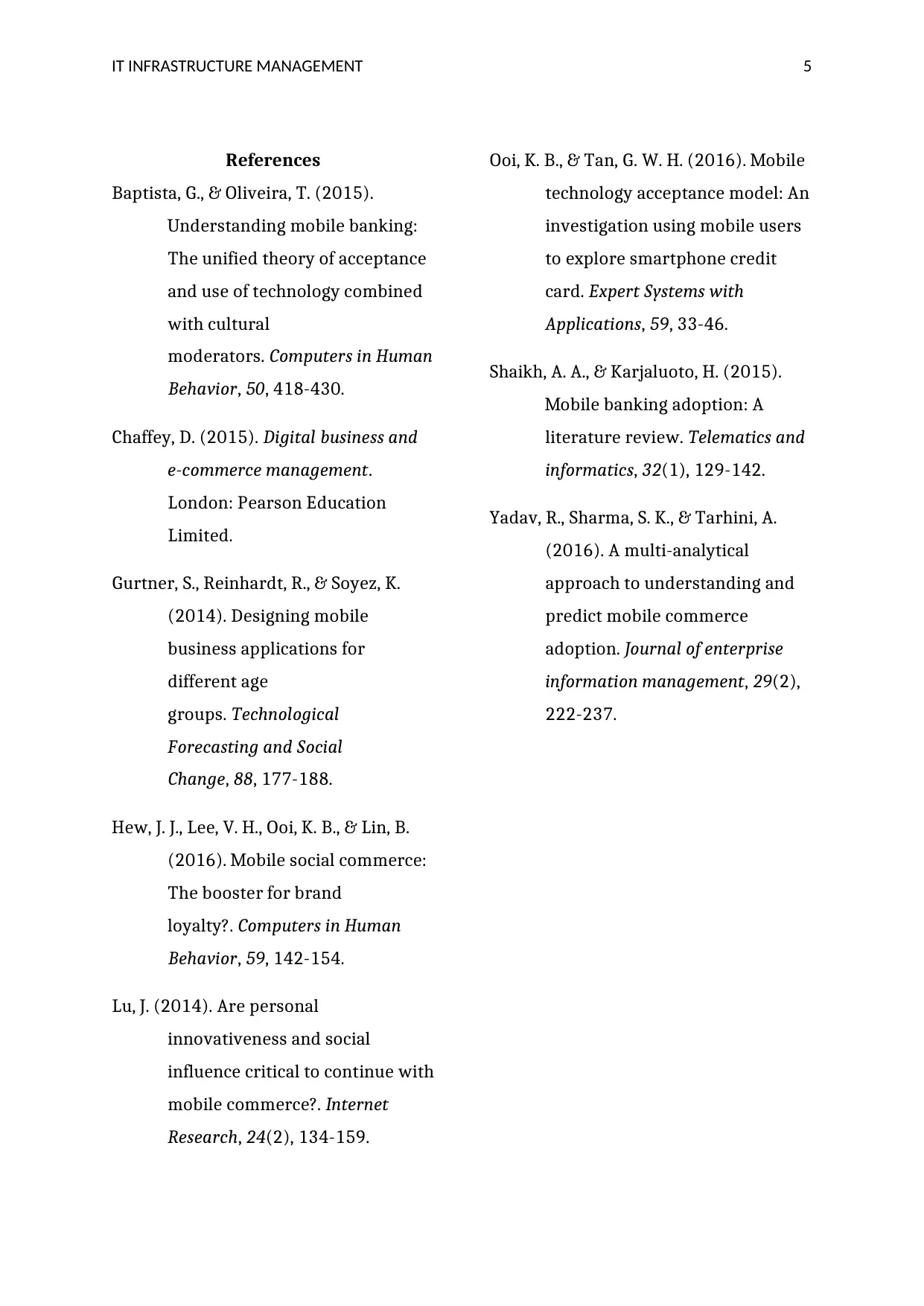
IT INFRASTRUCTURE MANAGEMENT 5
References
Baptista, G., & Oliveira, T. (2015).
Understanding mobile banking:
The unified theory of acceptance
and use of technology combined
with cultural
moderators. Computers in Human
Behavior, 50, 418-430.
Chaffey, D. (2015). Digital business and
e-commerce management.
London: Pearson Education
Limited.
Gurtner, S., Reinhardt, R., & Soyez, K.
(2014). Designing mobile
business applications for
different age
groups. Technological
Forecasting and Social
Change, 88, 177-188.
Hew, J. J., Lee, V. H., Ooi, K. B., & Lin, B.
(2016). Mobile social commerce:
The booster for brand
loyalty?. Computers in Human
Behavior, 59, 142-154.
Lu, J. (2014). Are personal
innovativeness and social
influence critical to continue with
mobile commerce?. Internet
Research, 24(2), 134-159.
Ooi, K. B., & Tan, G. W. H. (2016). Mobile
technology acceptance model: An
investigation using mobile users
to explore smartphone credit
card. Expert Systems with
Applications, 59, 33-46.
Shaikh, A. A., & Karjaluoto, H. (2015).
Mobile banking adoption: A
literature review. Telematics and
informatics, 32(1), 129-142.
Yadav, R., Sharma, S. K., & Tarhini, A.
(2016). A multi-analytical
approach to understanding and
predict mobile commerce
adoption. Journal of enterprise
information management, 29(2),
222-237.
References
Baptista, G., & Oliveira, T. (2015).
Understanding mobile banking:
The unified theory of acceptance
and use of technology combined
with cultural
moderators. Computers in Human
Behavior, 50, 418-430.
Chaffey, D. (2015). Digital business and
e-commerce management.
London: Pearson Education
Limited.
Gurtner, S., Reinhardt, R., & Soyez, K.
(2014). Designing mobile
business applications for
different age
groups. Technological
Forecasting and Social
Change, 88, 177-188.
Hew, J. J., Lee, V. H., Ooi, K. B., & Lin, B.
(2016). Mobile social commerce:
The booster for brand
loyalty?. Computers in Human
Behavior, 59, 142-154.
Lu, J. (2014). Are personal
innovativeness and social
influence critical to continue with
mobile commerce?. Internet
Research, 24(2), 134-159.
Ooi, K. B., & Tan, G. W. H. (2016). Mobile
technology acceptance model: An
investigation using mobile users
to explore smartphone credit
card. Expert Systems with
Applications, 59, 33-46.
Shaikh, A. A., & Karjaluoto, H. (2015).
Mobile banking adoption: A
literature review. Telematics and
informatics, 32(1), 129-142.
Yadav, R., Sharma, S. K., & Tarhini, A.
(2016). A multi-analytical
approach to understanding and
predict mobile commerce
adoption. Journal of enterprise
information management, 29(2),
222-237.
⊘ This is a preview!⊘
Do you want full access?
Subscribe today to unlock all pages.

Trusted by 1+ million students worldwide
1 out of 6
Related Documents
Your All-in-One AI-Powered Toolkit for Academic Success.
+13062052269
info@desklib.com
Available 24*7 on WhatsApp / Email
![[object Object]](/_next/static/media/star-bottom.7253800d.svg)
Unlock your academic potential
Copyright © 2020–2026 A2Z Services. All Rights Reserved. Developed and managed by ZUCOL.




